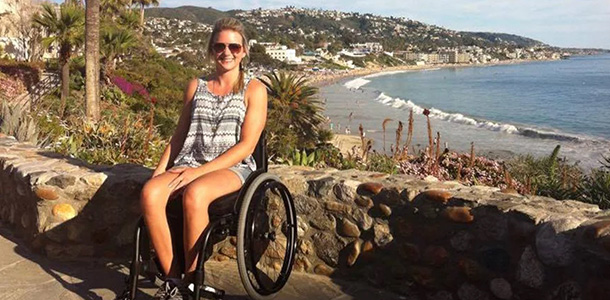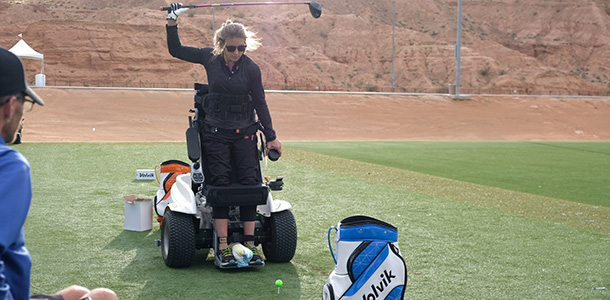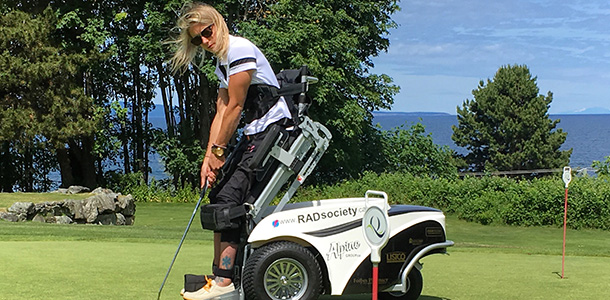Like a Bolt out of the blue
From her own personal experience, Tanelle Bolt wants to make the outdoors more accessible to the mobility-impaired
(This article first appeared in the November 2019 issue of Pacific Northwest Golfer magazine)
In her former life, Tanelle Bolt worked seven days a week managing two companies plus her own interior design company. She was also bartending three nights a week and had just discovered a love for fitness competition. In other words, she was a go-getter.

Then, on August 10, 2014, Tanelle jumped from a 60-foot tall bridge into a lake. When she made impact with the water, she fractured the T6 vertebra in her back and became a paraplegic.
She was 27 years old.
After her injury, she moved back to her hometown of Invermere, B.C. “I was lucky in that I had family and friends who pulled together some fundraisers to support my initial medical and living expenses,” Bolt says.
Paralyzed and wheelchair-bound, Bolt wasted no time pushing the limits of her recovery, trying to fill the new void as quickly as possible with outdoor activities, anything to keep her body active and her mind distracted.
But Bolt found her new journey difficult. “There is distinct lack of equipment and resources available to independent individuals living with mobility issues,” she says. “As someone who loved outdoor activities before my injury, I wanted to get back out there as soon as my broken body would allow me. This has been extraordinarily difficult, given the lack of adaptive equipment available, and the huge cost attached to this equipment. There are few resources that provide a selection of adaptive gear, and none that will allow an individual to loan this equipment out to try independently.”
What are termed “assistive devices” can cost anywhere in the range of $5,000-$30,000.
Still a go-getter, Bolt began to take action.

She decided to help others in similar situations by forming RAD Recreation Adapted Society, an organization that will help individuals with mobility issues to lead active lifestyles by providing an inventory of adaptive sporting and outdoor equipment for low-cost short- and long-term rental purposes.
“The RAD Society started as an idea that begun building in my head shortly after my injury,” Bolt says. “I was not prepared for the lack of available means to participate in activities with my newly-limited mobility.”
Bolt says RAD’s mission is to make outdoor recreation accessible to independent-living individuals with mobility issues by providing an inventory of adapted outdoor recreation equipment for low-cost rental fees.
“Ideally, we’d like to create a world where these individuals have the opportunity and means to live independent, active lifestyles,” she says.
RAD purchases the expensive equipment, and then makes it available to anyone for a low-cost rental fee, which allows them to use the equipment only when they want to, without the individual having to buy it.
The RAD Society also gives support to individuals who have sustained a life-altering injury. Volunteers will come to your town, provide peer support, and host a charity event to help with some of the major costs and stresses that occur after an injury.
“At RAD, we believe that sustaining a paralyzing injury doesn’t have to mean an end to your active, outdoor lifestyle,” Bolt says.

There are many assistive devices that allow a person to participate and excel in all of the activities they enjoyed before sustaining the injury, such as golfing, skiing, watersports, hiking, the gym, biking. “Anything is possible with the adaptive equipment.”
In early 2017, RAD Recreation Adapted Society officially became a registered charity.
“I feel strongly that a resource like RAD is filling a large hole in the promotion of active living among mobility-impaired people,” Bolt says. “There is a gap, and I’m trying to fill that gap.”
And we can think of nobody better to do so.
Visit RADsociety.ca to make a charitable donation and help Tanelle Bolt’s efforts in providing access to assistive devices for independent-living individuals with short-term and permanent mobility issues.
– Tom Cade, Editor






